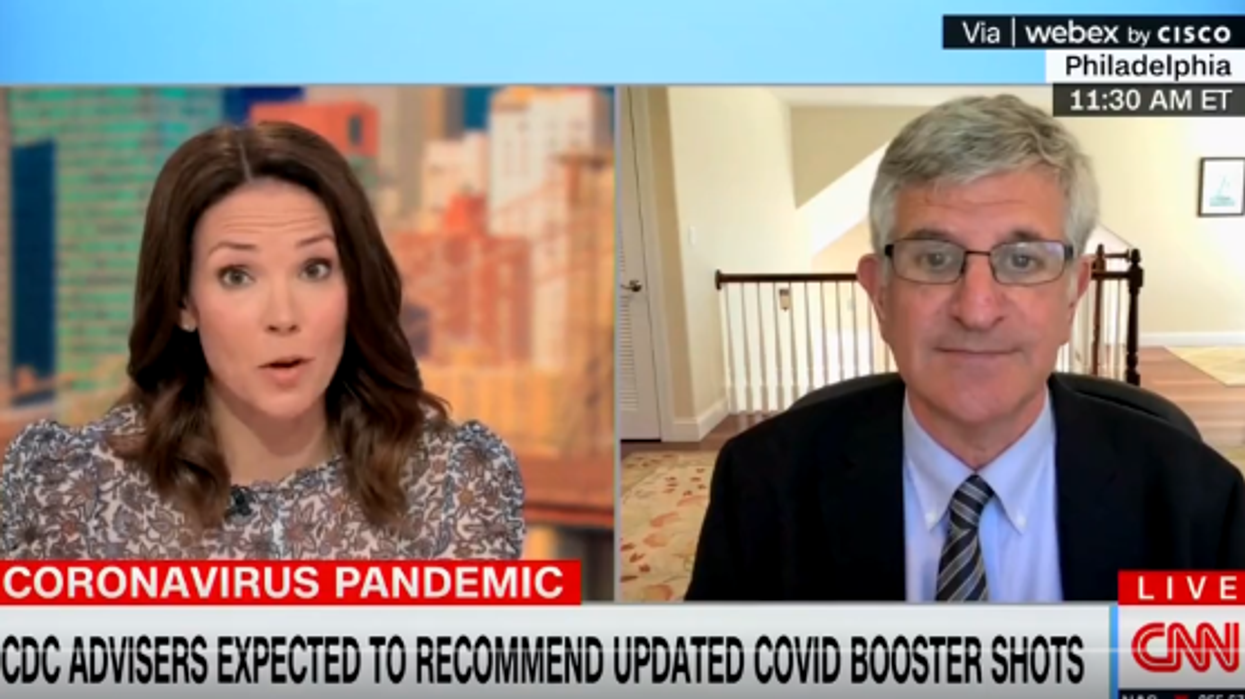
Twitter @SKMorefield Video Screenshot

A top vaccine expert is advising that healthy young people should not get the latest COVID-19 booster shot because "there's not clear evidence of benefit."
Paul Offit is the director of the Vaccine Education Center at the Children's Hospital of Philadelphia (CHOP), professor of pediatrics at the Perelman School of Medicine at the University of Pennsylvania, a member of National Institutes of Health (NIH) working group on vaccines, and a member of the U.S. Food and Drug Administration's Vaccines and Related Biological Products Advisory Committee (VRBPAC). Previously, Offit was a member of the Centers for Disease Control and Prevention's (CDC) Advisory Committee on Immunization Practices.
Offit is also one of the few vaccine experts voicing caution regarding the new COVID boosters.
On Aug. 31, the FDA granted emergency use authorizations (EUAs) of COVID-19 boosters from Moderna and Pfizer-BioNTech. The bivalent version of the previous vaccines are for use as a single booster dose at least two months following primary or booster vaccination. Moderna's mRNA booster shots are approved by the FDA for individuals 18 years of age or older, and the Pfizer-BioNTech version is authorized for those 12 or older.
However, Offit is advising healthy young people to skip the new booster shot.
During an appearance on CNN earlier this month, Offit said that those over 65, the immuno-compromised, and anyone with serious chronic health ailments could benefit from the boosters.
He was concerned that government health agencies were going to try to oversell the booster to everyone.
"What I fear is that they're going to say everybody should get it when in fact, the healthy young person really is unlikely to benefit from the booster dose, and so I hope they targeted more specifically, to those really who are most likely to benefit from this additional dose," he said during the CNN interview.
The CNN anchor was perplexed that the health official didn't recommend everyone get the new jab.
She asked the vaccine expert, "Why not get it? Right? If it does give you even if it's a smaller benefit, is there any reason not to get the booster?"
Offit replied, "I think that when you're asking people to get a vaccine, I think there has to be clear evidence of benefit, and we're not going to have clinical studies before this launches."
Moderna has begun human trials on the booster shots, and Pfizer is expected to begin theirs this month. Experts believe that trials likely wouldn't be completed until the spring.
"But you'd like to have at least human data people you know, getting this vaccine, you see a clear and dramatic increase in neutralizing antibodies, and then at least you have a correlate of protection against BA.4 and BA.5," he continued.
"You're asking people to get a new product for which there's no data," Offit also told CNN. "Mice data are not adequate to launch 100-plus-billion-dose effort."
The booster shot was authorized by the FDA despite not having been tested on humans. Pfizer's preliminary findings were based on tests on eight mice. The FDA based the EUA authorization on the testing of mice, data from current COVID-19 vaccines, and earlier iterations of boosters.
"Because if you don't have that, if there's not clear evidence of benefit, then it's not fair I think to ask people to take a risk no matter how small," Offit declared. "The benefit should be clear."
\u201cDr. Paul Offit fears CDC will recommend new Covid boosters for all when "a healthy young person is unlikely to benefit ..."\n\nAfter CNN pushback: "If there's not clear evidence of benefit, it's not fair to ask ppl to take a risk, no matter how small. The benefit should be clear."\u201d— Scott Morefield (@Scott Morefield) 1662058674
On Sept. 21, Offit wrote an op-ed in the Wall Street Journal titled: "CDC Oversells the ‘Bivalent’ Covid Shot."
"The Centers for Disease Control and Prevention recommends that everyone over 12 receive a 'bivalent' COVID-19 vaccine as a booster dose," he wrote. "But only a select group are likely to benefit, and the evidence to date doesn’t support the view that a bivalent vaccine containing omicron or its subvariants is better than the monovalent vaccine. The CDC risks eroding the public’s trust by overselling the new shot."
Americans are not rushing to get the latest booster shot.
According to CDC data released on Thursday, an estimated 4.4 million Americans received the new booster. That figure represents approximately 1.5% of people in the U.S. who are eligible to receive the injection.